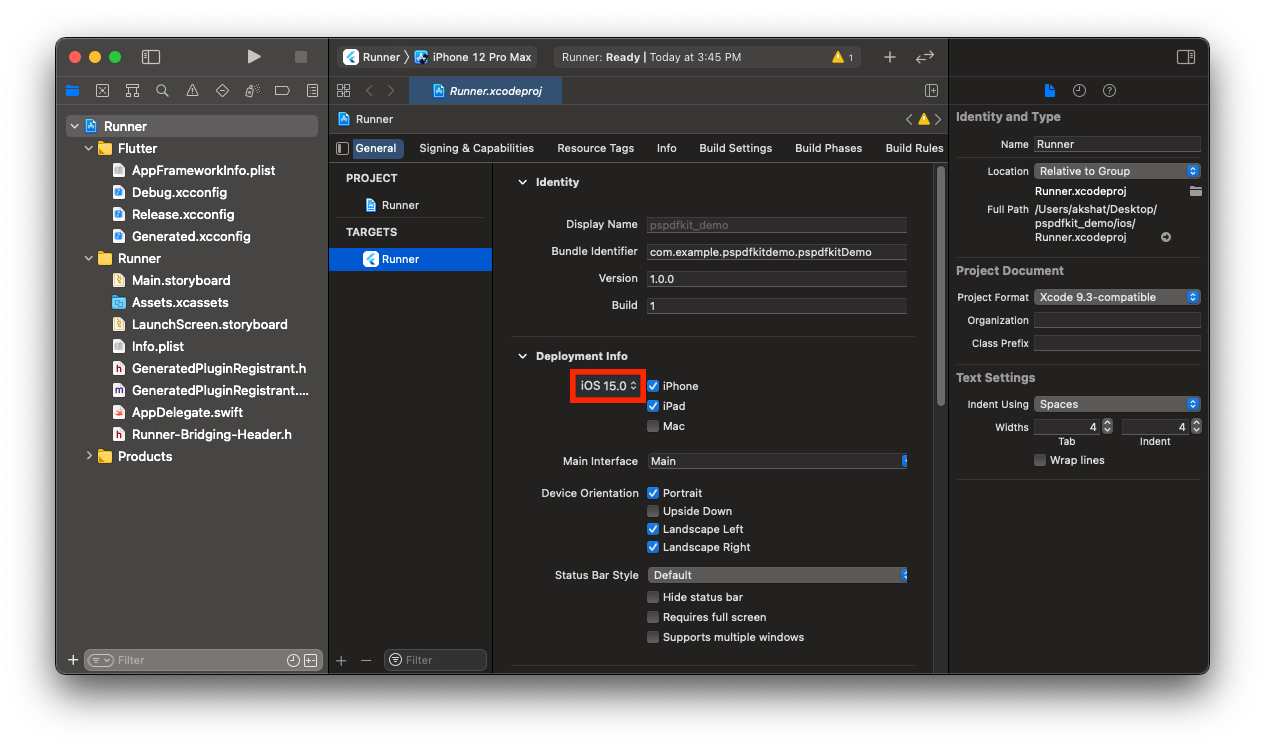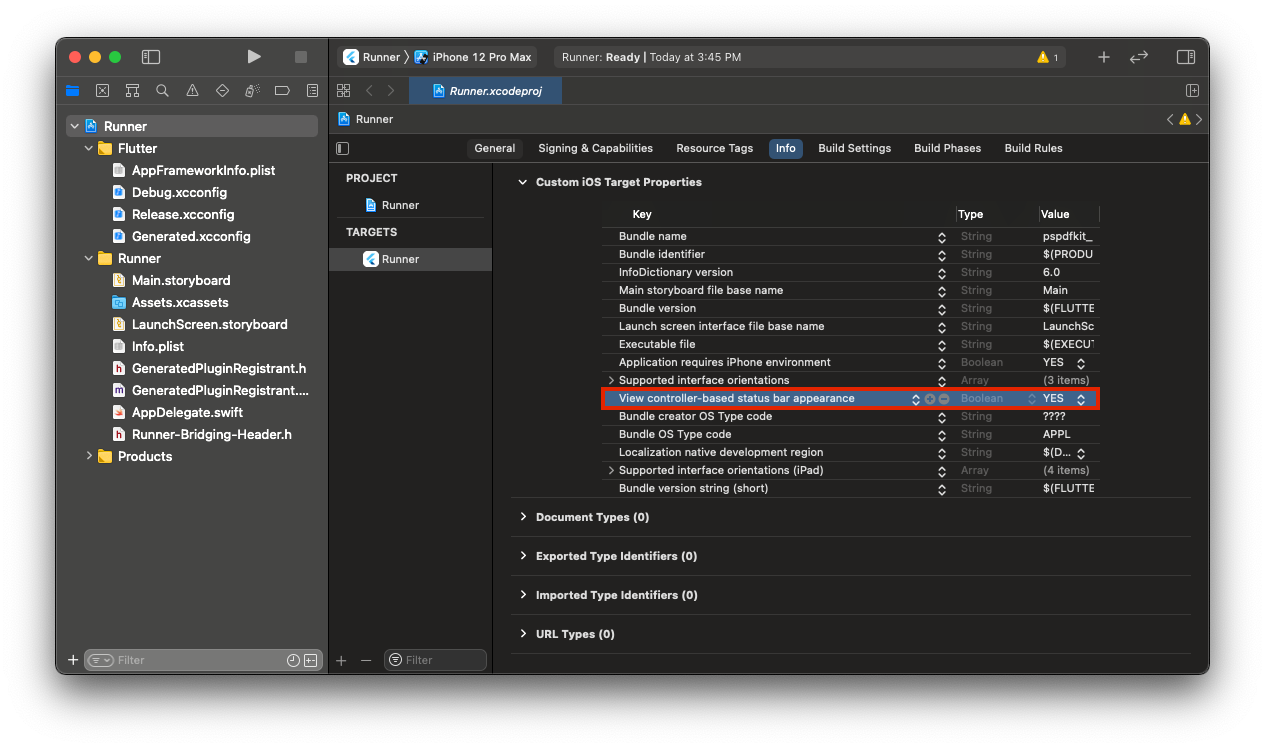Nutrient Flutter SDK is for viewing, annotating, and editing PDFs. It offers developers the ability to quickly add PDF functionality to any Flutter application. It is available at pub.dev and GitHub.
If you are new to Flutter, make sure to check our Flutter blog posts:
- Getting Started with Flutter PDF Library by Nutrient.
- Opening a PDF in Flutter.
- How to Customize Our Flutter PDF SDK.
- Advances in Hybrid Technologies.
- How We Maintain Our Public Flutter Project Using a Private Monorepo.
- How to Download and Display a PDF Document in Flutter with Nutrient.
For our quick-start guides, check out our website.
Platform specific README exists for Android and iOS.
-
Open
pubspec.yaml:open pubspec.yaml
-
Add the PSPDFKit dependency in
pubspec.yaml:dependencies: flutter: sdk: flutter + pspdfkit_flutter: any -
Open
lib/main.dartand replace the entire content with the contents of demo_project_main.dart.txt. This simple example will load a PDF document from local device filesystem. -
Add the PDF document you want to display in your project’s
assetsdirectory.-
First create a
PDFsdirectory:mkdir PDFs
-
Move a sample document into the newly created
PDFsdirectory, and rename it asDocument.pdf:cp ~/Downloads/PSPDFKit.pdf PDFs/Document.pdf
-
-
Specify the
assetsdirectory inpubspec.yaml:# The following section is specific to Flutter. flutter: + assets: + - PDFs/ ...
-
From the terminal app, run the following command to get all the packages:
flutter pub get
- The [latest stable version of Flutter][install-flutter]
- The [latest stable version of Android Studio][android studio]
- The [Android NDK][install ndk]
- An [Android Virtual Device][managing avds] or a hardware device
-
Create a Flutter project called
pspdfkit_demowith theflutterCLI:flutter create --org com.example.pspdfkit_demo pspdfkit_demo
-
In the terminal app, change the location of the current working directory to your project:
cd pspdfkit_demo -
Update the
pluginManagementblock in theandroid/settings.gradlefile as follows:pluginManagement { ... + buildscript { + repositories { + mavenCentral() + maven { + url = uri("https://storage.googleapis.com/r8-releases/raw") + } + } + dependencies { + classpath("com.android.tools:r8:8.3.37") + } + } } // Upgrade Kotlin version. plugins { id "dev.flutter.flutter-plugin-loader" version "1.0.0" id "com.android.application" version "7.3.0" apply false - id "org.jetbrains.kotlin.android" version "1.7.10" apply false + id "org.jetbrains.kotlin.android" version "1.8.22" apply false }This step involves enabling R8 for code shrinking (not required for AGP 8.* and above) and upgrading the Kotlin version.
-
Open the app’s Gradle build file,
android/app/build.gradle:open android/app/build.gradle
-
Modify the compile SDK version and the minimum SDK version:
android { - compileSdkVersion flutter.compileSdkVersion + compileSdkVersion 34 ... defaultConfig { - minSdkVersion flutter.minSdkVersion + minSdkVersion 21 ... } compileOptions { - sourceCompatibility JavaVersion.VERSION_1_8 - targetCompatibility JavaVersion.VERSION_1_8 + sourceCompatibility JavaVersion.VERSION_17 + targetCompatibility JavaVersion.VERSION_17 } // If you have this block, update the `jvmTarget` to 17. kotlinOptions { - jvmTarget = '1.8' + jvmTarget = '17' } ... } -
Add the AppCompat AndroidX library to your
android/app/build.gradlefile:dependencies { implementation "org.jetbrains.kotlin:kotlin-stdlib-jdk7:$kotlin_version" + implementation 'androidx.appcompat:appcompat:1.4.0' } -
Open the project’s main activity class,
android/app/src/main/kotlin/com/example/pspdfkit_demo/pspdfkit_demo/MainActivity.kt:open android/app/src/main/kotlin/com/example/pspdfkit_demo/pspdfkit_demo/MainActivity.kt
-
Change the base
Activityto extendFlutterAppCompatActivity:- import io.flutter.embedding.android.FlutterActivity; + import io.flutter.embedding.android.FlutterAppCompatActivity; - public class MainActivity extends FlutterActivity { + public class MainActivity extends FlutterAppCompatActivity { }
Alternatively you can update the
AndroidManifest.xmlfile to useFlutterAppCompatActivityas the launcher activity:<activity - android:name=".MainActivity" + android:name="io.flutter.embedding.android.FlutterAppCompatActivity" android:launchMode="singleTop" android:theme="@style/LaunchTheme" android:configChanges="orientation|keyboardHidden|keyboard|screenSize|locale|layoutDirection|fontScale|screenLayout|density|uiMode" android:hardwareAccelerated="true" android:windowSoftInputMode="adjustResize" android:exported="true">
NOTE:
FlutterAppCompatActivityisn’t an official part of the Flutter SDK. It’s a customActivitythat extendsAppCompatActivityfrom the AndroidX AppCompat library, and it’s necessary to use PSPDFKit for Android with Flutter. You can read more about this in the [AppCompatActivity Migration][] guide. -
Update the theme in
android/app/src/main/res/values/styles.xmlto usePSPDFKit.Theme.defaultas the parent:- <style name="NormalTheme" parent="Theme.AppCompat.Light.NoActionBar"> + <style name="NormalTheme" parent="PSPDFKit.Theme.Default">
This is to customize the theme of the PSPDFKit UI. You can read more about this in the [appearance styling][] guide.
-
[Start your Android emulator][start-the-emulator], or connect a device.
-
Run the app with:
flutter run
- The [latest stable version of Flutter][install-flutter]
- The [latest stable version of Xcode][xcode]
- The [latest stable version of CocoaPods][cocoapods releases]
-
Create a Flutter project called
pspdfkit_demowith theflutterCLI:flutter create --org com.example.pspdfkit_demo pspdfkit_demo
-
In the terminal app, change the location of the current working directory to your project:
cd pspdfkit_demo -
Open
Runner.xcworkspacefrom theiosfolder in Xcode:open ios/Runner.xcworkspace
-
Make sure the
iOS Deployment Targetis set to 15.0 or higher. -
Change "View controller-based status bar appearance" to YES in
Info.plist. -
Open your project’s Podfile in a text editor:
open ios/Podfile
-
Update the platform to iOS 15 and add the PSPDFKit Podspec:
-# platform :ios, '9.0' + platform :ios, '15.0' ... target 'Runner' do use_frameworks! use_modular_headers!` flutter_install_all_ios_pods File.dirname(File.realpath(__FILE__)) + pod 'PSPDFKit', podspec:'https://customers.pspdfkit.com/pspdfkit-ios/latest.podspec' end
-
Run
flutter emulators --launch apple_ios_simulatorto launch the iOS Simulator. -
Run the app with:
flutter run
- The [latest stable version of Chrome][chrome]
PSPDFKit for Web library files are distributed as an archive that can be extracted manually.
-
Download the framework here. The download will start immediately and will save a
.tar.gzarchive likePSPDFKit-Web-binary-<%= latest_version(:web) %>.tar.gzto your computer. -
Once the download is complete, extract the archive and copy the entire contents of its
distfolder to your project’sweb/assetsfolder or any other folder of your choice inside the web subfolder. -
Make sure your
assetsfolder contains thepspdfkit.jsfile and apspdfkit-libdirectory with the library assets. -
Make sure your server has the
Content-Type: application/wasmMIME typeset. Read more about this in the Troubleshooting section. -
Include the PSPDFKit library in your
index.htmlfile:
<script src="assets/pspdfkit.js"></script>-
Run the app with:
flutter run
To see PSPDFKit for Flutter in action check out our Flutter example app.
Showing a PDF document inside your Flutter app is as simple as this:
PspdfkitWidget(documentPath: 'file:///path/to/Documentpdf')Nutrient is a commercial product and requires the purchase of a license key when used in production. By default, this library will initialize in demo mode, placing a watermark on each PDF and limiting usage to 60 minutes.
To purchase a license for production use, please reach out to us via contact_sales.
To initialize Nutrient using a license key, call either of the following before using any other Nutrient APIs or features:
To set the license key for both Android and iOS, use:
await Pspdfkit.initialize(
androidLicenseKey:"YOUR_FLUTTER_ANDROID_LICENSE_KEY_GOES_HERE",
iosLicenseKey:"YOUR_FLUTTER_IOS_LICENSE_KEY_GOES_HERE",
webLicenseKey: "YOUR_FLUTTER_WEB_LICENSE_KEY_GOES_HERE"
);To upgrade Nutrient for Flutter in your app, please refer to the Upgrade and Migration Guides section.
For Troubleshooting common issues you might encounter when setting up Nutrient for Flutter, please refer to the Troubleshooting section.


